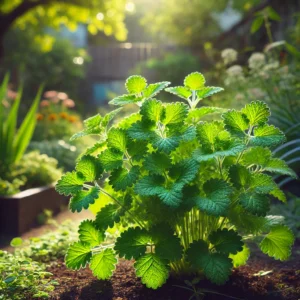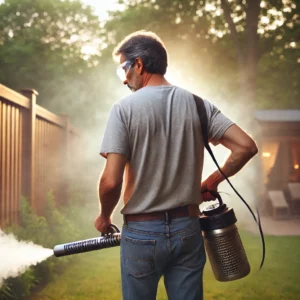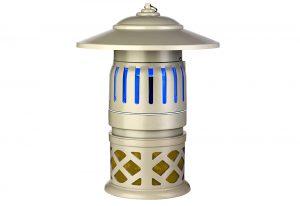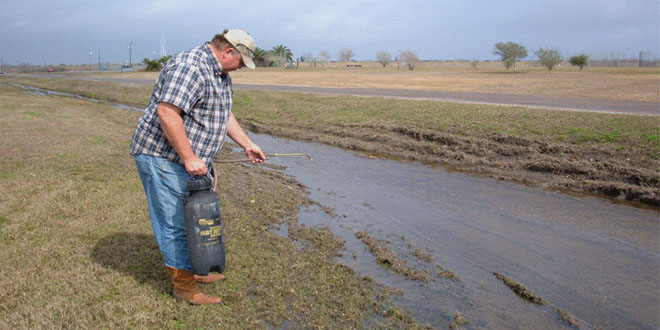People often ask us how they can get rid of the mosquitoes that are in their yard, patio, or area around your home.
The bad news is that by the time you have a large mosquito population to deal with, you are too late to deal with them the best way: Prevention. The ideal approach for controlling mosquitoes is to never let the population explode in the first place.
The good news is that preventative measures, if done correctly, can build off each other and result in a steep reduction in mosquitoes!
We always recommend using mosquito repellents anytime you are outside during mosquito season, but are there things you can do to make your entire yard less attractive to mosquitoes?
Yes.
Everyone knows that mosquitoes are annoying, but there are serious health reasons for keeping mosquito colonies from forming around your yard or home. The advent of the Zika virus is just the latest in a number of mosquito-borne issues that present real health risks. Mosquitoes also carry more common diseases like West Nile Virus, and in other parts of the world more deadly afflictions like Malaria.
Five Ways to Control Mosquitoes in Your Yard
Eliminate all Standing Water
The single most important thing you can do to manage mosquito populations is to manage standing water in your environment. Mosquitoes love standing, still water. To them, a nice little puddle that doesn’t go away for a few days is the perfect home. Larger bodies of water, like rivers and lakes, are actually less attractive to them as long as the water is clean and moving (many lakes have slow currents, and even when they don’t the water is often constantly moving around).
Studies show that there is a correlation between a high number of mosquitoes, and water with a lower oxygen content. It makes sense, water gets oxygenated when it is moving and mixing with air. Stagnant, still water has low oxygen.

Be sure to eliminate (or treat) any of these breeding grounds in your yard. The obvious ones are puddles and small ponds, but there are many other places that you should look as well. It has been said that mosquitoes can breed in as little as a half inch of water!
- Landscape ponds
- Lawn or yard ornaments with standing water features
- Buckets that accumulate rainwater or runoff
- Puddles
- Bird baths
- Ruts that hold standing water
- Edges of lakes or ponds where dirty water pools. (a simple sandy or grass shoreline is best)
- Clogged gutters and downspouts, leaving exposed, pooled water gutter guards can be a DIY way to solve this)
- Plant bowls saucers
- Other items that can collect rainwater or runoff – such as a wheelbarrow that is not turned upside down
Some of these are pretty easy to fix – such keeping buckets indoors and dry, or turning your wheelbarrow over. Others are not as easy, but perhaps even more important. What if you have a low spot in your yard that routinely puddles? It might make sense to build that area up for proper drainage, even if it means hauling in fill and resodding. What if you live near a pond? Work with your municipality to keep the shoreline free of standing, shallow-pooled water.
I once was in a yard that had a bad mosquito problem, and when I looked around the building, I noticed that they had rain barrels to collect water, but they were all uncovered! An uncovered rain barrel is a perfect spot for mosquitoes to do their thing in, especially if the barrel is only partially full. I am all for re-using rainwater, but those barrels need to be covered.
Additionally, note that mosquitoes generally prefer water that is about 2 feet or less in depth. If you are going to do some kind of water feature, one thing you can do is make it nice and deep so the water moves a bit more (assuming you don’t have young kids around….. in which case, their safety should always be paramount).
Note that while standing water is a favorite for mosquitoes, it is the running and moving water that attracts those biting black flies. There are different steps to take against black flies.
If You Cannot Get Rid of Standing Water, Consider Treating It for Mosquitoes

While the best, and typically most green, solution to mosquito breeding grounds is to eliminate the water, sometimes this can be very difficult. Areas like drainage ponds, runoff drains, or some landscape features are inherently designed to hold water. Perhaps you have a small pond that you really like, and you know that it can be hard to keep mosquitoes away from ponds. What, then, can be done to be sure that water does not become the preferred home of a mosquito colony?
While prevention is always preferred to treatment, treatment of mosquito breeding grounds is strongly preferred to allowing a thriving group of the bugs to reproduce and spread illness. There are a few was to treat standing water, the simplest being an every-30-day treatment that can prevent larvae from growing. Mosquito Dunks and Bits are the most popular and easiest way to to this. These dunks and bits come in a solid format and can treat a large pond for a month or so. They are about as easy to use as possible — you simply toss one into the water, and it slowly floats around and treats the water.
While manufacturers claim they are organic, we can only comment that from a layperson’s viewpoint, they sure seem safe. Plus, we have a point-of-view that the effects of mosquito diseases are likely worse than the effects of throwing one of these into your pond.
Mosquito Dunks have a cousin called the Mosquito Bits, found here on Amazon. The only difference is that dunks are slow-release and meant to be used to treat water for 30 days. Bits deploy all of their larvae-fighting agents within 24 hours or so.
There are also liquid forms of water treatment, which may work more quickly but typically need to be reapplied every week or so. The active ingredient is Sodium Lauryl Sulfate. The jury is still on the safety of SLS to humans – but it is the same ingredient found in things like soaps, shampoos, and beauty care products.
One notable, and emerging natural method for controlling mosquito larvae in water, is to use coffee grounds. Studies are showing that coffee grounds can prevent young mosquitoes from developing. It is one of the more promising organic mosquito control solutions we are seeing right now.
As for standing water that comes in the form of a hot tub or pool, treatment is a little easier. Make sure that you are keeping the pool covered if possible. Perhaps the most critical thing you can do is keep the pool cleaned regularly, per the pool company’s or manufacturer’s instructions, and keep the water moving. Most pools and hot tubs have a feature that exchanges water at a low rate of speed. Such features move the water just enough so it is not the stagnant water that mosquitoes love to breed in.
Control Tall Grass and Shrubbery where Mosquitoes Like to Live

Mosquitoes like to rest in tall grass, plants, and shrubs. This is a little different than the water issue, because water is actually where mosquitoes breed. Eliminate water, and you make it hard for mosquitoes to reproduce. Long grass, on the other hand, is where mosquitoes like to spend their resting time.
Mosquitoes fly in, and often hide in tall grass during the daytime. That is why you often encounter mosquitoes when you take a walk in long grass even though the rest of a yard or park might seem mosquito-free – you are stirring them up. In the tall grass, they eat, lay eggs (if there is moisture), and breed. All the things you do NOT want them to do.
Keeping grass cut to a length of 5 inches or preferably less will prevent mosquitoes from congregating there. You will simply be forcing them to go somewhere else, but it is still better than having the bugs around humans and spreading disease.
If you are unable to eliminate the tall grass – perhaps you are going for a native look, it is on a hillside, or it is not your property – then at least put key human activity areas such as playsets or outdoor dining areas away from the long grass patch.
Finally, do what you can to clear out invasive species. If you live in a northern climate, Buckthorn is a common weed that quickly grows into a shrub and then a small tree. Buckthorns have no real value and are considered highly invasive, and the extra vegetation will be a great home base for mosquitoes and other bugs. Get rid of them.
Use Mosquito-Repelling Plants
Compared to the others on this list, make sure you temper your expectations for how much plants can keep mosquitoes at bay. Still, many people are looking for organic and green ways to deal with mosquitoes, and there is no greener way than by planting something. There are some plants that mosquitoes tend not to like, and using them might help reduce the number of mosquitoes in your environment. It won’t eliminate them, and it certainly won’t reduce the mosquitoes’ ability to reproduce, but there could be some slight effect.
to like, and using them might help reduce the number of mosquitoes in your environment. It won’t eliminate them, and it certainly won’t reduce the mosquitoes’ ability to reproduce, but there could be some slight effect.
Note that you always need to compare each plant to your hardiness zone, growing conditions, and soil and sunlight requirements, but here are some plants known to be unattractive to mosquitoes.
- Citronella Grass or Lemon Grass. (find here on Amazon) Citronella oil has been shown to have strong mosquito-deterring qualities, and it comes from Citronella Grass. Lemon grass works very well, too. The downside for many is that this is a grass that typically grows only in the southern, warmer climates – but it still should do well in the mosquito-heavy areas of Florida, Louisiana, and Texas. Not for Northern climates.
- Basil. Yes, this is the same basil that you keep in your spice rack. Basil is an excellent herb to have around, useful in many recipes, and easy to grow in most parts of the country.
- Lemon Balm. Note that it is considered invasive, so if you plant it you will need to keep it contained. If you let it go and spread, you are not doing any favors for your local environment.
Again, don’t expect these grasses to be any kind of end-all, be-all to your mosquito problems, but if used with some of the other techniques you might see a positive impact.
Not a fan of growing plants? You can always burn the oils from these plants using a tiki torch for mosquito control. The oils burned in a tiki torch are often derived from Citronella, so they can work great for a smaller area. The only downside? It will burn out after a while. Temporary control only.
Consider Strategically Fogging or Spraying Key Parts of Your Yard
The image of fogging a yard for mosquitoes – someone in a mask and gloves, spewing a fog or mist into the air from a backpack mosquito fogger – is not exactly one that evokes environmentally friendliness. Still, fogging has its place, even for the typical homeowner. We think that some people whose yards are particularly attractive to mosquitoes may want to consider the occasional fogging. This means using a product with the active ingredient of pyrethroid** or cyfluthrin to treat key areas. Those key areas include the following:
- Shaded areas
- Shrubs and long grass
- Areas within 12-15 feet of key human activity (e.g. patio, playsets)
Given the chemical compound you should take care when applying these chemicals, but when used in moderation and in a targeted manner, they can help to make an impact on the localized mosquito population. Just note that you aren’t really killing the mosquitoes or preventing them from breeding, so you are basically just kicking the problem down the street. Still, if you have children playing outside, or are about to have an event in your backyard, we’d rather see a touch of chemical be smartly used than have someone get West Nile because of a bite. While these chemicals can be applied with garden sprayer-like equipment and Cutter makes a pretty simple do-it-yourself variety that is sold in both smaller quantities as well as 64-ounce jugs. If you have doubts about your ability to administer any type of chemical safely, we would suggest hiring a professional.
Keep in mind that the container for any type of chemical should be disposed of safely. Pesticides and insecticides are often concentrated, and the residue left on the containers or jugs should be handled with care. When in doubt, consult the ACRC on how best to dispose. ACRC is a nonprofit devoted to safely disposing ag, homeowner, and other chemical containers.
** Note that pyrethroids are also harmful to pollinators. They are bee killers. We are passionate about getting rid of mosquitoes, but we are equally passionate about helping our important bee population. If you use pyrethrin, use it sparingly and strategically. Avoid using it near flowering plants, and try to use it early in the morning before bees are active. Pyrethroids should be used to target specific problem areas, not as a broad application to your property.

Mosquito Killers: Zappers, Magnets
You can also try a mosquito killer, magnet, or zapper, a device that actually will kill mosquitoes upon contact. Mosquito traps also fall into this category. While the best solution is to do something that will actually keep mosquitoes away, a mosquito killer will help control the population once it already exists. Not a root-cause fix, a zapper or magnet can be effective if you want to use your patio or pool, but it is too late to take the preventative steps against mosquito breeding.
Magnets attract mosquitoes with CO2 and then trap them inside until they die. Zappers and racket kill on contact with a pulse of electricity.
If all else fails, just be sure you keep the mosquitoes from biting you, by using mosquito repellent or spray. Those bites can be more than just annoying – they can make you sick!
If you are not a fan of zappers and magnets, you can always go the old-fashioned route and use a Tiki Torch. When combined with the right kind of tiki torch fuel for mosquitoes, it will have some repelling qualities, but just remember it is not a root cause fix. Tiki torches work great on a contained area, especially if you are taking other measures such as getting rid of nearby standing water.
Getting Rid of Mosquitoes Fast
If you have a mosquito problem and need to get rid of mosquitoes fast, you probably want to lean toward the repellent or professional control options. Eliminating standing water is the best root cause solution, but the effects will take a little longer.
As noted above, use insect repellents to keep mosquitoes away from you and your family. DEET is an effective repellent and can be found in various forms such as sprays, lotions, and candles. You can also use citronella candles or torches to repel mosquitoes from your outdoor living areas.
Consider using a professional mosquito control service. These services use targeted treatments to eliminate mosquito breeding grounds and apply long-lasting insecticides that can reduce mosquito populations for weeks.
A mosquito misting system might also be a good, permanent option for those yards where mosquitoes are a chronic problem. Just know that you will have a steady flow of chemicals though, so perhaps not best in yards where many kids are consistently active.
For both options, be sure that the mosquito-control method aligns with how pollinator-friendly you want your yard to be.
Conclusion
There are a few things you can do to reduce mosquitoes in your yard, park, or local environment. In addition to these outdoor tips, keep in mind that you should also focus on indoor mosquito prevention as well. Just remember that some of these are mosquito repelling techniques – and we would really like to see you eliminate the breeding grounds. That is where true population control can occur. To that end, eliminating standing water is the most critical thing you can do, and it should be done repeatedly. The other techniques are useful as well, but really pale in comparison to making sure you aren’t giving the bugs an easy way to reproduce.
More and more, natural and organic ways of repelling mosquitoes are of major interest to our readers and the community at large. We are continuing to work with professors and researchers to bring the latest news and findings to you, so you can gradually become less-dependent on potentially harmful chemicals, and instead use natural techniques which are better for the environment and future generations.
If you have reduced the population of mosquitoes in your yard, but perhaps have not completely gotten rid of them (a scenario which is quite common), play it safe and protect yourself. Having a good mosquito repellent on hand at all times is important if you live in a mosquito-prone area, and we are big fans of using a mosquito shirt if you plan to be outside for long periods of time in mosquito-populated areas.






